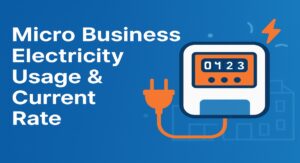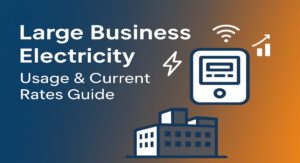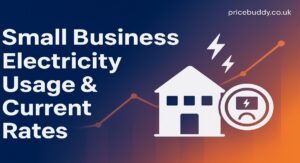Energy prices remain one of the biggest challenges for small and medium-sized businesses (SMEs) in the UK. In 2025, the business market continues to experience price instability due to volatile wholesale prices, supply chain disruptions, and government charges. Since there is no official cap on business prices, choosing the appropriate business energy tariffs can be the difference between budget predictability and surprise cost burden. The appropriate choice not only ensures cost control but also offers flexibility to adjust according to future market dynamics. At Price Buddy, we help SMEs navigate these challenges by comparing and securing the most competitive tariffs available. The right choice will not only help manage expenses but also provide flexibility to adapt to future market changes.
What is a Business Energy Tariff?
An energy tariff definition is an explanation of how you are charged by your supplier, either for gas or electricity supply, depending on the amount of consumption and a standing charge.
How It Differs from Domestic Tariffs
Business energy tariffs are slightly different from household tariffs in a variety of ways:
- Most are determined by your real consumption profile, not a typical household-averaged profile.
- VAT is usually levied at the rate of 20% (there are certain exemptions for certain usages).
- The contracts are cumulatively longer, and their cancellation is not frequently possible.
It implies that the companies have to plan strategically in their contracts to ensure that they are not committed to an uncompetitive price.
Types of Business Energy Tariffs
When choosing business energy tariffs. It’s essential to understand the types available. Each tariff type offers unique benefits and limitations depending on your business size, usage patterns, and budget priorities.
-
Fixed-rate
A fixed tariff sets your unit price and standing charge for a contract period, normally one to five years. It gives you regular budget stability and price protection against unexpected price increases.
-
Variable-rate
A variable tariff is one where charges can go up or down as wholesale prices change, but this gives flexibility and also means your bills can go up at any time. Businesses that can cope with the cost fluctuations may benefit if prices in the market fall.
-
No Standing Charge
Energy tariffs without standing charge remove the daily fixed fee, so you only pay for the energy you use. No standing charge energy tariffs are ideal for businesses with very low or seasonal consumption, though they often come with higher unit rates.
-
Smart -Green Tariffs
Smart energy tariffs use smart meters or half-hourly data to match your rates to actual market conditions or time-of-use. Green tariffs source all or part of your supply from renewable energy, helping meet sustainability goals.
Fixed vs Variable Tariffs
Fixed tariffs
-
- Pros: Guaranteed prices, budgeting is simplified, and you are not affected by volatile markets.
Cons
- s: No advantage when the market prices decline, exit costs if you want to quit ahead of time.
Variable tariffs
- Pros: The ability to switch without paying high fees, and savings can be made in case of a decrease in prices.
- Cons: Risk of getting larger bills when the market goes high, and more difficult to predict spending.
Variable tariffs may appeal to risk-tolerant companies in an uncertain energy market in 2025, whereas fixed tariffs would be acceptable to conservative companies that have less risk tolerance.
Finding the Cheapest Business Energy Tariff Deals
The cheapest energy tariffs cannot be obtained by simply going with the lowest rate, which is advertised. One is not to jump at the first price offered by a supplier but to compare quoted prices by suppliers and carefully review the unit rate, the standing charge, and consider the terms of the contract, including duration and exit fee. The additional values also need to be looked at, in the form of bill credits or discounts to the loyal customers. Bear in mind that the cheapest rate does not necessarily provide the most favorable deal-particularly when the tariff schedule being offered does not suit the usage pattern of your business.
At Price Buddy, we specialise in helping businesses compare offers from multiple suppliers, ensuring you review both the unit rate and the standing charge and factor in the contract length, along with any potential exit fees.
Smart Energy & Green Energy Tariffs
Smart energy tariffs are growing in popularity thanks to technology that provides real-time usage tracking and flexible pricing. Businesses can shift operations to off-peak periods to lower bills.
Green energy tariffs are an investment in long-term sustainability. They can enhance brand image, help meet corporate social responsibility targets, and prepare your company for stricter environmental regulations.
Advantages:
- Reduced environmental impact
- More accurate billing and usage insights
- Potential to benefit from off-peak rates
Considerations:
- May require specific metering equipment
- Availability and rates vary by supplier.
Key Factors Before Choosing
-
Usage & Contract Length
Find places to analyse your annual and seasonal consumption. Companies where the usage is predictable can enjoy long-term fixed deals, whereas companies where operating usage is variable would consider short-term or variable contracts.
-
Price Trends & Volatility
Observe wholesale prices trends. In case the markets are likely to go up, it is best to fix rates in advance. A drop is probable, and a variable tariff can save.
-
Policy and Market Changes
Energy policy changes, such as new taxes, subsidies, or infrastructure updates, can influence prices. Staying informed helps you time your contract decisions better.
How to Compare Energy Tariffs
When carrying out an energy tariff comparison UK, it is important to follow a simple but thorough process to get the best results. Start by recording your current business energy tariffs details and your annual usage in kWh. Next, decide on your priority, whether you value cost stability with fixed plans, flexibility with variable rates, green sourcing, or smart energy tariffs. Compare energy tariffs from multiple providers, taking time to evaluate the full cost, including unit rates, energy tariffs without standing charge, and any additional fees. Check the contract terms, notice periods, and renewal conditions to avoid hidden costs. Finally, review your tariff annually to ensure you are still benefiting from the cheapest energy tariffs available for your business.
Frequently Asked Questions
Q1: What is the definition of an energy tariff?
An energy tariff is the charging pattern by which your supplier bills you in terms of gas or electricity. It has the price of the unit rate per kWh and the standing charge. This is the case in the business energy tariff, where they are always customized to the use of your company, or more so, according to the type of contract, and in some instances, even the industry sector.
Q2: Are there price caps for business energy?
No, energy tariffs UK business world have no price cap. This implies that the energy tariffs charged by business suppliers can be quite different, and it is also necessary to use regular energy tariff comparison UK checks to ensure that you are on the most competitive business energy tariff.
Q3: Which is better, fixed or variable?
Fixed business energy tariffs offer cost certainty by locking in rates for the duration of your contract, making budgeting easier. Variable tariffs follow market prices, which can lead to lower bills when prices fall but may increase costs during volatile periods. The right choice depends on your risk tolerance and ability to track prices.
Q4: What are no-standing charge energy tariffs?
With no standing charge energy tariffs, the daily fixed fee is removed, hence you only pay for what you use. Small or seasonal businesses with low usage are usually best suited to these energy tariffs that do not have a standing charge. However, typically higher and full cost comparison must first be done before making commitments.
Q5: How can I find the cheapest business energy tariffs?
To get the cheapest energy tariffs for your business, start by auditing your annual consumption, then compare energy tariffs from multiple suppliers. Look beyond just the unit rate, consider standing charges, contract length, and any exit fees. This ensures you find the cheapest business energy tariffs that match your usage profile.
Stay Ahead in the Energy Market
The business with the greatest chance at cost-effectiveness in 2025 is a business that regularly changes and revises its energy arrangements. Routine energy tariff comparison UK checks will make sure you are not tied into outdated or overpriced deals. By venturing into the new kind of tariffs-like smart energy tariffs, no standing charge energy tariffs, or green version, you can search and select a tariff that is more apt for your changing needs.
At Price Buddy, we do all this easily, enabling you to compare energy prices of trusted energy providers, the cheapest business energy tariffs, and the terms that support your bottom line. By adopting smarter technology, keeping current with market change, and collaborating with a price comparison company such as Price Buddy, you can be certain to know you are on top of your game in an unstable energy market.















